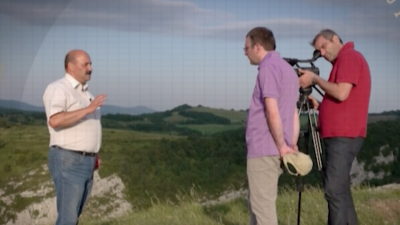
In the midst of the 44-day war in Nagorny Karabakh in 2020, Indie Peace spoke with individuals about their experiences of the conflict. The aspect of trauma was acutely clear. These conversations sparked the idea of researching the impacts of trauma on society and the conflict, and to support local communities in getting actively involved in their own rehabilitation. Conciliation Resources partnered with Indie Peace to support this process.
We spoke to Indie Peace about the challenges they faced and the importance of trauma-informed approaches to peacebuilding, which they hope will open new avenues for dialogue and practical cooperation.
Not just a humanitarian issue
Juliet explains that one of Indie Peace’s aims is to incorporate a psycho-socio-political perspective that has previously been lacking from the peacebuilding discourse, bringing an appreciation of how psychology, politics and society all influence each other. With more than 20 years’ experience of working on conflict in eastern Europe, Larissa and Juliet have seen the idea of trauma co-opted, for example through propaganda, and the manipulation of historical narratives. ‘A lot of the focus of peacebuilding has been on the media – to try to counterbalance propaganda or fake news – but there has been little focus on trauma, which helps to explain why people might be susceptible to manipulation’, Juliet says.
With their recent research publication, Collective Wounds – Societal Trauma and the Karabakh Conflict, Indie Peace wants to raise awareness about trauma’s effects on society, and how to work with it in support of peace. The report is based on a series of gently guided interviews with respondents from all sides of the conflict who were invited to talk freely about trauma in relation to the conflict. The insights from these conversations are complex and multi-layered, but although people are at first reluctant to acknowledge the impact of trauma and to seek support, it doesn’t take much prompting for them to reflect on their experiences of trauma. “People want to talk about feeling ‘different’ after the war. They know ‘something is wrong”, Larissa says, “but they’re reluctant to seek professional support either through shame or a lack of understanding”.
Although the report demonstrates that trauma is a key feature of Armenian and Azerbaijani societies in the aftermath of the 2020 war, there is a need for greater understanding and awareness about its impacts on both individuals and society. Indie Peace wants its publication to serve as a practical tool to inform and facilitate a public discussion on trauma. It is hoped this will start to shift societies away from painful, destructive narratives and towards more life-affirming and constructive approaches based on cooperation and dialogue.
Providing trauma therapy and counselling
In parallel to the research, Indie Peace offered one-to-one counselling sessions and online training. These taught skills for dealing with trauma to individuals in Nagorny Karabakh who work closely with their communities – teachers, doctors, psychologists and social workers. Larissa and Juliet explain that in times of war, adrenaline keeps people going. But when the violence ends, and the societal, cultural and political institutions through which people make sense of world have been destroyed, it is difficult to find positive mechanisms to cope with trauma. People can disengage from usual community life. The idea behind these practical initiatives is to support those individuals who are most community-orientated to re-engage with society, facilitating a wider process of healing and rehabilitation in society.
“It’s a model that’s produced results in other contexts in the past,” Larissa notes, “but you can’t just introduce it automatically into a new context.” There has to a be a demand from within, which needs to be fostered. In Nagorny Karabakh there aren’t many other options for psychological support, and practical group sessions on subjects like art therapy or working with displaced persons, act as form of group therapy where individuals could also develop their own coping strategies.
Challenges and new opportunities
“Rehabilitation means you can accept how your experience affects you and be able to relax. You no longer need to remain hyper-vigilant to potential danger,” says Larissa. But for people in Nagorny Karabakh, the threat of ongoing violence and a resumption of hostilities keep people in a constant state of preparedness. Furthermore, the pandemic, poor internet connections, and crowded living conditions all create challenges for people to access the online counselling sessions and training. These have perhaps been seen as an indulgence that people couldn’t allow themselves on a regular basis. Nevertheless, Indie Peace’s work has sowed the seeds for new in-person initiatives, including the idea of a community rehabilitation centre offering therapy and other forms of trauma support to different groups.
Larissa and Juliet also think that trauma-informed analyses, and a focus on practical activities to address trauma could create new entry points for dialogue. In the words of one respondent, “trauma allows people to see the other side, to ‘understand the enemy’”. However, focusing on mental health also brings peacebuilding practitioners into contact with groups of people – psychologists and social workers for example – who have not previously engaged much in dialogue. This could inform new models for supporting people to engage across the divide, as well as offering the potential to form a new network bringing together conflict practitioners and psychologists.
There is noticeable demand for greater focus on trauma in Nagorny Karabakh. Larissa and Juliet say that frank and open discussion about societal trauma is still absent. Their report is a start, but increased recognition in society that the issue exists will be key to the success of any future initiatives.
Photo: Living in the shadow of the front line, between Barda and Agdam, Azerbaijan © Larissa Sotieva/Indie Peace
The report discussed in this article was prepared with financial support from the European Union. The views expressed in the publication are the sole responsibility of Indie Peace and do not necessarily reflect the views of the European Union.
Funded by the European Union





